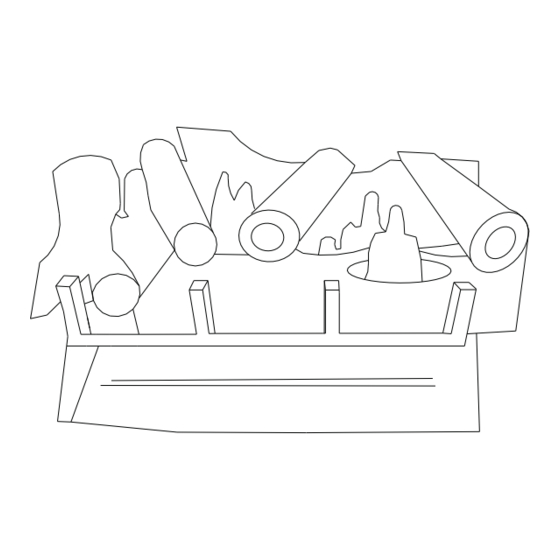Appalachian Stove & Fabricators UV-EF-MIL 30-P Manuel d'installation et d'utilisation - Page 8
Parcourez en ligne ou téléchargez le pdf Manuel d'installation et d'utilisation pour {nom_de_la_catégorie} Appalachian Stove & Fabricators UV-EF-MIL 30-P. Appalachian Stove & Fabricators UV-EF-MIL 30-P 11 pages. Gas log heaters

Other Important Items:
1. Operator should not adjust the flame by the control knob. (See Important Information and Lighting Instructions.)
2. Extended use may cause air hole on left rear burner tube to clog up. This will make the flames appear taller which
could cause a carbon or sooting problem.
3. Logs not placed correctly will cause sooting.
If sooting occurs, this unit should not be operated until the problem is diagnosed!
Other not so common problems may cause sooting.
1. Incorrect line to unit. Check with local building codes for proper line sizes, and no kinks in any line are acceptable.
2. Low fuel pressure in tank.
3. Draft from fans such as ceiling fans or proximity to doorway that causes flames to dance erratically.
4. Anything sitting too close, or in front of the unit, may cause an obstruction of air flow to the gas logs.
Chimney Height
(Min. Permanent
free opening)
6 ft.
8 ft.
10 ft.
15 ft.
20 ft.
25 ft.
30 ft.
(Minimum permanent free opening in square inches based on 6' height)
IMPORTANT: Ensure that the chimney draft is adequate by holding a lit match or candle at the top
edge of the fireplace opening. This will indicate if air movement is toward the fireplace. If draft is
inadequate, do not operate logs until draft is adequate. If the draft is insufficient, have it inspected by a
qualified chimney sweep.
Instructions for Vented Applications
This unit may be installed in areas where building codes require all gas appliances to be vented, if
and only if the following guidelines are met. Those guidelines fall into the National Fuel Gas Code
ANSI Z223.1 standard.
This appliance must be installed in a solid fuel burning fireplace with a working flue and
constructed with non combustible material.
Permanent Free Opening
The minimum permanent free opening that must be provided by either the fireplace chimney or
chimney damper to vent the flue gas must be in accordance with the table in Figure 10.
Secure Chimney Damper
The chimney damper must be fixed in a manner which will maintain the minimum permanent vent
opening at all times (By screw, bolt at damper's edge to prevent its closing, or by a hole or holes in the
damper).
Solid fuels shall not be burned in a fireplace where a decorative fireplace is installed. The
installation and provisions for combustion and ventilation air must conform with the
Code, ANSIZ223.1/NFPA54.
Ensure periodic examination and cleaning of the venting system of the solid fuel burning fireplace
at least once a year by a qualified agency.
Decorative appliances for installation in solid fuel burning fireplaces shall not be thermostatically
controlled. Additions such as thermostats or other automatically cycling devices are not permitted.
Additions such as thermostats or other automatically cycling devices are not permitted.
EF-N, 39,000 Btu's
EF-P, 35,000 Btu's
34 square inches
32 square inches
29 square inches
27 square inches
24 square inches
23 square inches
22 square inches
MIN FLUE DIAMETER: 7"
Diameter of
Std. Round Flue
5in
6in.
7in
8 in
Area
20 sq.in.
29 sq.in.
39 sq.in.
51 sq.in.
National Fuel Gas
Figure 10
8
